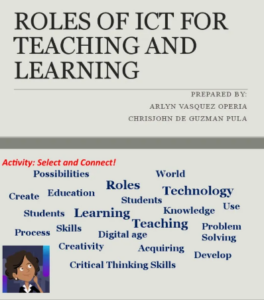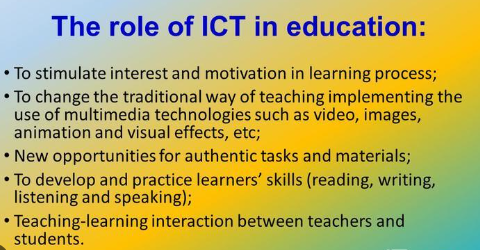In today’s fast-paced digital world, Information and Communication Technology (ICT) has become a cornerstone of education. This transformative tool is revolutionizing the way we teach and learn. From primary schools to universities, ICT is reshaping classrooms, making education more accessible, interactive, and effective. Let’s delve into the role of ICT in learning and explore how it is fostering a brighter future for learners worldwide.
Enhancing Accessibility
One of the foremost advantages of ICT in education is its ability to break down barriers and make learning accessible to all. No longer confined by geographical limitations, students from remote areas can now access high-quality education online. Through e-learning platforms and virtual classrooms, learners can participate in courses and interact with educators from around the globe. This global perspective enriches their understanding and broadens their horizons.
Moreover, ICT has opened doors for individuals with disabilities, making education inclusive. Assistive technologies, such as screen readers and speech recognition software, empower students with diverse needs to engage with educational content on an equal footing with their peers.
Promoting Interactive Learning
Incorporating ICT in education fosters interactive learning environments that captivate students’ attention and stimulate their curiosity. Traditional chalk-and-board methods are evolving into dynamic, multimedia-rich lessons. Interactive whiteboards, educational apps, and virtual simulations engage students in hands-on experiences that enhance comprehension and retention.
Furthermore, online discussion forums and collaborative tools enable students to participate actively in the learning process. They can exchange ideas, ask questions, and work together on projects, fostering critical thinking and problem-solving skills. Moreover, this interactivity nurtures a sense of community among learners, even in virtual settings.
Facilitating Personalized Learning
ICT empowers educators to tailor their teaching methods to individual students’ needs, preferences, and learning styles. Adaptive learning software can assess each student’s progress and adapt the curriculum accordingly, ensuring that learners receive personalized instruction. This approach maximizes learning outcomes by catering to each student’s strengths and weaknesses.
Additionally, the vast resources available on the internet enable students to explore topics that pique their interest. They can delve deeper into subjects, conduct independent research, and pursue their passions. Hence, this freedom to explore fosters self-directed learning, nurturing a lifelong love for knowledge.

Improving Assessment and Feedback
Assessment and feedback are integral components of the learning process, and ICT has revolutionized how educators approach them. Online quizzes, automated grading systems, and data analytics provide real-time insights into student performance. This data-driven approach allows educators to identify areas where students may be struggling and provide timely support.
Moreover, digital portfolios and e-portfolios enable students to showcase their achievements and growth over time. Therefore, these comprehensive records not only track academic progress but also help students develop essential skills such as self-reflection and goal setting.
Breaking Down Language Barriers
Language diversity can be a significant obstacle to education, but ICT offers solutions to bridge this gap. Online translation tools and language learning apps empower students to overcome language barriers and access educational content in their native language. This inclusivity ensures that no one is left behind due to language limitations.
Furthermore, ICT facilitates language learning by immersing students in real-world language contexts. Interactive language apps and virtual language exchanges enable learners to practice their language skills with native speakers, enhancing fluency and cultural understanding.
Preparing for the Future
As we navigate the 21st century, digital literacy is no longer a luxury but a necessity. ICT in education equips students with essential skills that prepare them for the demands of the modern workforce. Proficiency in digital tools and online research is crucial in a world where technology is integrated into almost every profession.
Moreover, ICT encourages students to think critically and adapt to rapidly changing environments. The ability to solve complex problems and innovate is highly valued in today’s job market, and these skills are nurtured through the use of technology in education.
Conclusion
In conclusion, Information and Communication Technology is not just a tool; it is a catalyst for transformation in education. It has the power to break down barriers, promote interactive learning, personalize instruction, improve assessment, bridge language gaps, and prepare students for the future. Embracing ICT in education is not an option; it is a necessity to ensure that learners of all ages have the best opportunities to thrive in our interconnected world. By harnessing the potential of ICT, we are paving the way for a brighter and more inclusive future of education.











